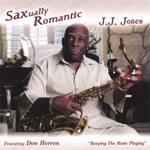Home » Jazz Articles » Profile » J.J. Jones: Reunited With His Horn
J.J. Jones: Reunited With His Horn
Jones and his tenor sax had come to prominence amidst a plethora of horn players of the day like Eddie Harris, Earl Bostic, Sil Austin Julian "Cannonball Adderley and Stan Getz plus a generation of singing greats to include Little Richard, Billy Wright, Willie Mae "Big Mama Thornton and Jimmy Witherspoon. He even remembers calming down an anxious blues singer making his debut on the live stage in Atlanta in 1953. "I was watching television the other night and there was B.B. King accepting the Presidential Medal of Freedom, Jones chuckled from Los Angeles where he now makes his home. "I remember telling him from backstage of the Ponciana Club to relax and just be himself. He was shaking like a bowl of jelly.
For the last 35 years, however, Jones hasn't touched a saxophone. In fact, Jones, who pursued record production for a time in LA and Atlanta in the 1960s and 70s, washed his hands of music, period. "I retired," he said. "My wife [Tracy] and I got into the business of ceramics and were doing fairly well. I just decided to focus on that and raising my family.
With the kids grown and doing well, Jones began re-thinking his abandoned music career, and especially the saxophone. "I was a gifted musician, he said. I started playing instruments in high school in Atlanta, and the band director noticed that I wasn't reading the music. In fact, when I got my first professional job with a band playing at a local night club in town, some of the band members noticed the same thing. They told the bandleader John Peek that I wasn't reading a note. He told them what's the difference. He's playing the music right, isn't he?
 Almost a year ago, he met Benedikt Bryden, an accomplished arranger and writer, and their conversation about music blossomed into a friendship. The result was a collaboration that eventually became a CD called Saxually Romantic (Jay Man Records, 2006).
Almost a year ago, he met Benedikt Bryden, an accomplished arranger and writer, and their conversation about music blossomed into a friendship. The result was a collaboration that eventually became a CD called Saxually Romantic (Jay Man Records, 2006).
But first things first. Jones sought out a Selmar saxophone. "It's the best horn ever made and the only one I've ever played, he said. After probing for weeks, he found one and immediately plucked down $7,000 for it. He began practicing daily to get the kinks out. He then assembled a team of accomplished musicians, many coming from the New Christ Memorial Church where Jones is an avid member.
Weeks later, he walked into Hollywood's Private Island Trax studio still a bit unsure of himself. "It's been 35 years man, he said, with a slight laugh. But the recording session turned out flawless. "I have never played the saxophone that well, even at my apex in the '50s, he said. "I simply cannot explain it except to say that it is a gift from the Creator.
He is so close to each of the eleven selections on the CD that he cannot really isolate one particular favorite. He does seem to a lean a little on the first track of the CD, "How Do You Keep the Music Playing. He readily admits that he accomplished his goal for the project, however. "I think it's time to bring the sax back to the prominence it once enjoyed back in the day, says Jones.
Tags
PREVIOUS / NEXT
Support All About Jazz
 All About Jazz has been a pillar of jazz since 1995, championing it as an art form and, more importantly, supporting the musicians who make it. Our enduring commitment has made "AAJ" one of the most culturally important websites of its kind, read by hundreds of thousands of fans, musicians and industry figures every month.
All About Jazz has been a pillar of jazz since 1995, championing it as an art form and, more importantly, supporting the musicians who make it. Our enduring commitment has made "AAJ" one of the most culturally important websites of its kind, read by hundreds of thousands of fans, musicians and industry figures every month.





















